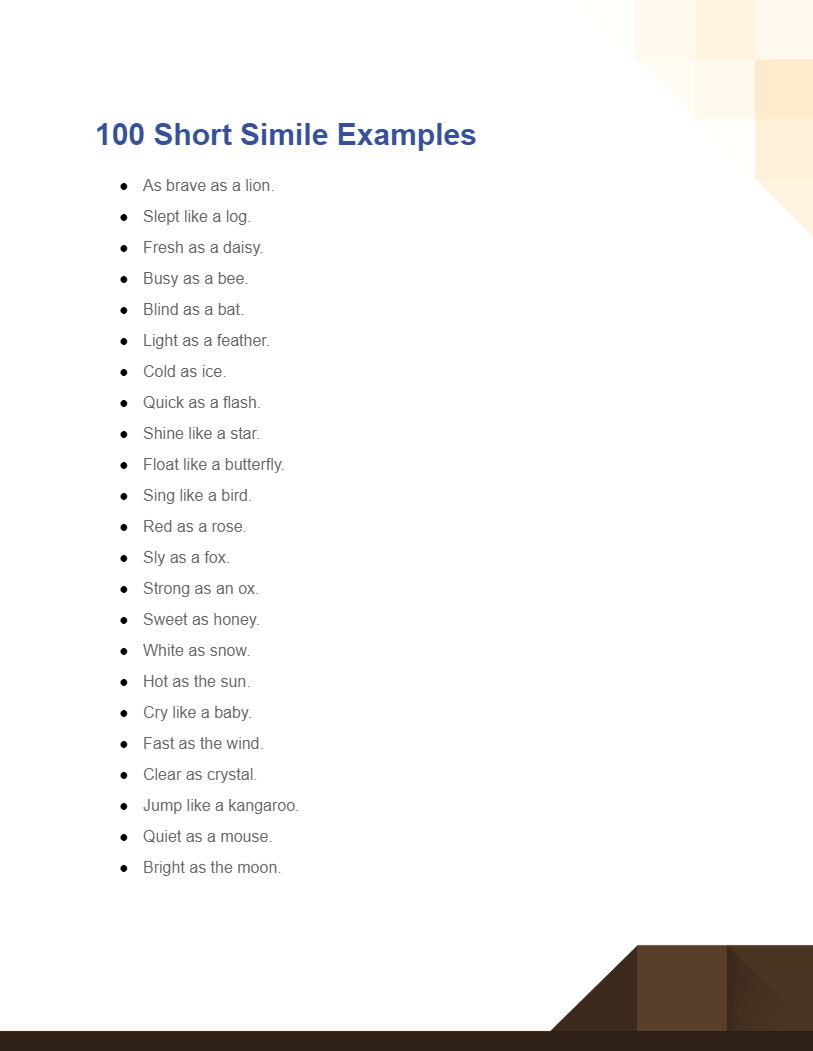99+ Short Simile Examples
In the realm of literary devices, short similes are the gems that shine brightly, albeit briefly. Their concise nature captures the essence of comparisons with striking clarity, allowing readers to instantly visualize and connect. While they may seem simple on the surface, crafting a poignant short simile example is truly an art form. Dive into our curated guide to uncover the nuances of these miniature marvels, learn how to write them with finesse, and explore tips to elevate your own writing.
What is a Short Simile? – Definition
A short simile is a concise literary device that draws a direct comparison between two distinct objects or concepts using the words “like” or “as.” Unlike extended similes that provide a detailed analogy, short similes are succinct, offering an immediate and vivid image in just a few words. Their brevity packs a punch, making them especially impactful in poetry, song lyrics, and prose where economy of words is essential.
What Is the Best Example of Short Simile?
The best example of a short simile is often subjective, as it depends on the context and the audience’s preferences. However, one of the most universally recognized and frequently used short similes is:
“As brave as a lion.”
This simple simile conveys a significant amount of meaning in just a few words. Lions are often associated with courage, strength, and fearlessness, so comparing someone’s bravery to a lion immediately offers a vivid image of their courage. This simile is also easy to understand and has been used across cultures and generations, making it a timeless choice.
100 Short Simile Examples

Dive into the world of compact, vivid comparisons with these short similes. Each offers a snapshot of imagery, capturing grand ideas in the fewest words. Here’s a curated collection of 100 short similes that span a range of emotions, themes, and ideas, perfect for adding zest to your literary endeavors.
- As brave as a lion.
- Slept like a log.
- Fresh as a daisy.
- Busy as a bee.
- Blind as a bat.
- Light as a feather.
- Cold as ice.
- Quick as a flash.
- Shine like a star.
- Float like a butterfly.
- Sing like a bird.
- Red as a rose.
- Sly as a fox.
- Strong as an ox.
- Sweet as honey.
- White as snow.
- Hot as the sun.
- Cry like a baby.
- Fast as the wind.
- Clear as crystal.
- Jump like a kangaroo.
- Quiet as a mouse.
- Bright as the moon.
- Proud as a peacock.
- Slippery as an eel.
- Fit as a fiddle.
- Dry as a bone.
- Sharp as a knife.
- Pure as gold.
- Dull as dishwater.
- Cool as a cucumber.
- Tall as a giraffe.
- Soft as silk.
- Heavy as lead.
- Thin as a rail.
- Hard as a rock.
- Green as grass.
- Gentle as a lamb.
- Rich as a king.
- Clean as a whistle.
- Smooth as glass.
- Stubborn as a mule.
- Fly like an eagle.
- Dance like a leaf.
- Shiny as a penny.
- Tight as a drum.
- Wet as a fish.
- Spread like wildfire.
- Laugh like a hyena.
- Bloom like a flower.
- Steady as a clock.
- Blue as the ocean.
- Float like a cloud.
- Sound like thunder.
- Tight as a tick.
- Stand like a statue.
- Swim like a fish.
- Bend like a willow.
- Run like the river.
- Burn like fire.
- Sneaky as a cat.
- Big as a mountain.
- Small as an ant.
- Wild as a tiger.
- Smooth as butter.
- Plain as day.
- Fierce as a dragon.
- Dark as night.
- Loyal as a dog.
- Merry as a cricket.
- Fine as wine.
- Steep as a cliff.
- Free as a bird.
- Round as a ball.
- Deep as the sea.
- Rich as cream.
- Old as time.
- Rumble like thunder.
- Flicker like a candle.
- Cold as steel.
- Sparkle like a diamond.
- Melt like butter.
- Flow like water.
- Drift like smoke.
- Roar like a lion.
- Sizzle like bacon.
- Glow like a firefly.
- Crawl like a snail.
- Flutter like a butterfly.
- Dive like a dolphin.
- Twist like a tornado.
- Shine like a beacon.
- Burst like a bubble.
- Break like glass.
- Climb like a monkey.
- Twist like a pretzel.
- Sparkle like glitter.
- Fade like a dream.
- Rise like the sun.
- Fall like rain.
Use these short similes to invigorate your writings, lending depth and imagery with minimal effort. They’re the proof that sometimes, less is indeed more.
Short Simile Examples in Poetry
Poetry often uses similes to paint vivid pictures with limited words. Short similes examples for poetry can lend a poem nuance and depth, bridging emotions and imagery. Here are ten brief similes used in poetry:
- As silent as the stars.
- Laughed like the ringing of chimes.
- Fears like shadows on the wall.
- Her smile, as brief as a summer dusk.
- As restless as a willow in wind.
- Words as light as a feather’s fall.
- Like a lily among the thorns.
- As fleeting as a dream at dawn.
- Tears as silent as dewdrops.
- Hopes that shine like distant stars.
Short Simile Examples in Literature
Literature thrives on figurative language, with short similes examples in literature succinctly delivering powerful images. Here are ten memorable short similes from various literary works:
- Eyes like twin pools of midnight.
- As empty as a broken jar.
- Laughter like the tinkling of bells.
- Thoughts as tangled as old yarn.
- As quick as a fox in the night.
- Like a moth to a flame.
- Heart cold as marble.
- As unpredictable as a rolling dice.
- A voice like whispered silk.
- As pale as a winter morning.
Short Simile Sentence Examples
Similes can punctuate sentences, offering a burst of imagery or emphasis. These ten short simile sentence can be seamlessly integrated into broader sentences:
- As sharp as a tack.
- Sly as a fox.
- Slept like a log.
- Quick as a wink.
- Blind as a bat.
- Hungry as a horse.
- As cold as ice.
- Tough as nails.
- Smooth as silk.
- Fresh as a daisy.
Short Story Simile Examples
Short stories, with their brevity, benefit from concise similes that convey rich imagery. Here are ten examples:
- Her hope was as thin as paper.
- He moved like a shadow in the night.
- As loud as a siren’s wail.
- His anger was like a storm, quick and violent.
- Eyes as deep as ocean trenches.
- As fragile as a spider’s web.
- Memories as faded as old photographs.
- Like a fish out of water.
- As clear as a bell’s ring.
- His guilt was as obvious as a stain on a shirt.
Funny Short Simile Examples
Humorous funny similes can bring smiles and chuckles. Here are ten lighthearted examples:
- As clumsy as a bear on roller skates.
- Like a bull in a china shop.
- As useful as a chocolate teapot.
- Snored like a chainsaw in harmony.
- As rare as hen’s teeth.
- As slow as a snail on vacation.
- As confused as a chameleon in a bag of Skittles.
- Grinning like a Cheshire cat.
- As lost as a penguin in the desert.
- As easy as stealing candy from a baby – but who would do that?
Short Simile Examples for Kids
For children, simple and vivid similes are the most effective. Here are ten examples for simile for kids suitable for young minds:
- As bright as the sun.
- Hungry as a bear.
- Soft as a bunny’s fur.
- Float like a butterfly.
- As shiny as a new penny.
- As big as an elephant.
- As colorful as a rainbow.
- Sneaky as a cat.
- Happy as a clown.
- As slow as a turtle.
Short Simile Examples for Students
Simile for students who are delving into literature and writing, relevant and relatable similes can be useful tools. Here are ten examples:
- As endless as a math class.
- Nervous as before a big test.
- Like finding a needle in a haystack.
- As welcome as a weekend.
- Felt as light as after finishing exams.
- As timeless as a classic novel.
- Stress melting away like snow in spring.
- As unpredictable as pop quizzes.
- Like juggling homework, sports, and sleep.
- As refreshing as a summer break.
How do you Write a Short Simile? – Step by Step Guide
- Understand the Basics of a Simile: A simile is a figure of speech that compares two different things using “like” or “as”. For instance, “brave as a lion” or “shines like a diamond”.
- Define Your Objective: Decide what you want to convey. Are you emphasizing a characteristic, evoking emotion, or painting a vivid image?
- Choose the Subject: Start with the primary subject you want to describe, e.g., “her smile”.
- Brainstorm Comparative Elements: Think about things in nature, everyday objects, or familiar scenarios that can enhance the image or feeling you’re trying to convey about the subject.
- Use “Like” or “As”: Incorporate the words “like” or “as” to make the comparison. E.g., “Her smile shines like the morning sun.”
- Keep it Short and Sweet: Since the focus is on writing a short simile, ensure it’s concise. Ideally, it should be no longer than six to eight words.
- Test its Impact: Say the simile aloud. Does it resonate? Does it immediately evoke a specific image or feeling?
- Refine and Edit: Like all writing, the first draft might not be perfect. Tweak the simile as needed, ensuring it remains brief and impactful.
Tips to Writing Effective Short Simile
- Stay Relevant: Ensure that the comparative element in your simile is relevant to your audience. A simile will lose its impact if its reference is unfamiliar.
- Avoid Clichés: Phrases like “as busy as a bee” or “as clear as mud” are overused. While they’re easily understood, they might not be as impactful due to their familiarity. Aim for originality.
- Be Vivid with Descriptions: The more evocative your comparative element, the more vivid the image or emotion you’re trying to convey.
- Ensure Logical Comparisons: While similes are based on figurative language, they should still make logical sense. For instance, comparing someone’s speed to a snail might work, but comparing their height to a snail might not.
- Maintain Context: The simile should fit the tone and context of what you’re writing. A humorous simile might not be appropriate in a serious or somber piece.
- Practice Regularly: Like all forms of writing, the more you practice writing similes, the better you’ll become. Challenge yourself to incorporate similes into your daily writing or conversation.
- Read Widely: Expose yourself to different forms of literature, poetry, and prose. The more styles and examples you come across, the more refined your understanding and application of similes will be.
- Seek Feedback: Share your similes with friends, family, or peers. Sometimes, an outsider’s perspective can help refine or strengthen your figurative language.
Remember, a well-crafted simile can elevate your writing, making it more engaging and resonant. Whether you’re a budding poet, a novelist, or just someone looking to enhance everyday communication, mastering the art of the simile is a valuable skill.


